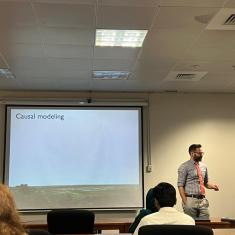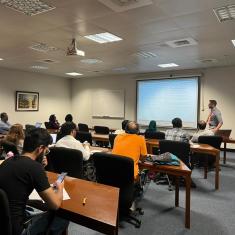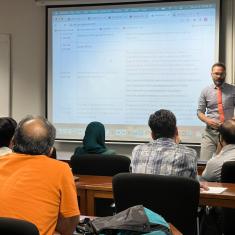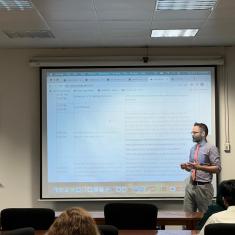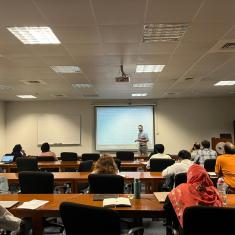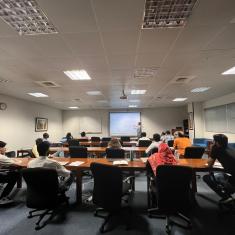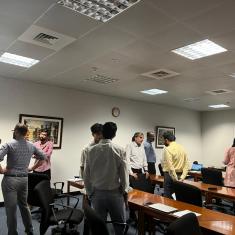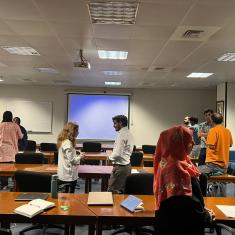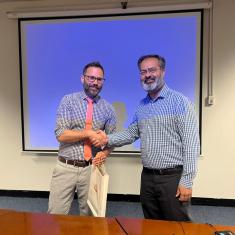This is the page of a workshop from the previous year. To go to the webpage of the Nexus Summit, 2024 please click the link below
https://wit.lums.edu.pk/nexsum2024
The Centre for Water informatics and Technology (WIT), is organizing a workshop on Integrating Social Sciences into Irrigation System Research on June 6, 2023. Dr. Andrew Bell from the Department of Earth and Environment will be leading the workshop delivery. The aim of the workshop is to couple current and future efforts among physical and social scientists working in the area of irrigation development. We invite researchers and practitioners working in this area to participate in the workshop.
Date: June 06, 2023
Venue: Dean's Smart Room, 4th Floor, SBASSE Building, LUMS
Participation: To apply for participation in the conference, please fill out the registration form at the link below. Please note that only a limited number of individuals can be accommodated in the workshop. Participation will be confirmed only after acknowledgement from the workshop organizers.
Registration link: click here
About the Lead Person: Andrew Bell studies livelihoods and resource decision-making, including domains of irrigation, pest management, ecosystem services, technology adoption, and migration. Most of his work applies survey and experiment tools (games, high-frequency smartphone-based surveys) to identify and model behavior; and agent-based models to understand what these behaviors imply for system-level outcomes under scenarios of environmental change. He received his PhD (2010) in Natural Resource Management from the University of Michigan’s School of Natural Resources and Environment (SNRE, now SEAS), a MASc in Environmental Engineering from Waseda University, and a BASc in Environmental Engineering from the University of Waterloo.
Schedule:
Time | Activity | About |
|---|
| 9:30 AM - 10:00 AM | Arrival and Introduction | |
| 10:00 AM - 10:30 AM | Overview | |
| 10:30 AM - 11:00 AM | Introduction to systems thinking and causal modeling | Building a simple shared understanding of systems concepts in order to be able to describe key questions/processes using the language of causal connection and feedback Kim, “Introduction to Systems Thinking” Kim, “Systems Thinking Tools” |
| 11:00 AM - 11:30 AM | Coffee and Tea break | |
| 11:30 AM - 12:00 PM | Charette 1: What differences across irrigators shape irrigation outcomes and how? | In this small group session, groups are encouraged to consider how - for the irrigation outcomes of greatest interest to them - what differences among irrigators have the greatest impact on outcomes, and through what mechanisms |
| 12:00 PM - 12:30 PM | Debrief and discussion | Identification of key measures of irrigator behavior of highest priority to integrate into other irrigation systems research |
| 12:30 PM - 1:00 PM | Glimpses of Ongoing Research | Current important efforts made by the organizers in the area of integrating behavioral science into irrigation research |
| 1:00 PM - 2:30 PM | Lunch Break | |
| 2:30 PM - 3:00 PM | A brief overview and introduction to games and experiments | This session is intended to introduce the range of experimental approaches used to measure different aspects of behavior - group-level framed field experiments to learn about coordination and competition, individual experiments to learn about risk or other preferences, high-frequency experiments to learn about preference stability. https://agupubs.onlinelibrary.wiley.com/doi/full/10.1002/2014WR015704 https://dukespace.lib.duke.edu/dspace/handle/10161/23911 https://www.nature.com/articles/s43247-023-00689-6 https://link.springer.com/article/10.1007/s11111-019-0314-1 |
| 3:00 PM - 3:30 PM | Charette 2: Where are the most promising opportunities for integrating social science into irrigation research / decision-making | The hope for this charette is to integrate what has been discussed up to this point - what problems exist, what behaviors matter, and what tools are available - to identify specific sites / programs / research areas / projects where we could plan to integrate social science experimental research |
| 3:30 PM - 4:00 PM | Debrief and discussion | Specific plans (what program, which people, which tasks, what timeline) to take next steps toward integrating social sciences into irrigation research. |
| 4:00 PM - 4:30 PM | Next steps and closing remarks | |

